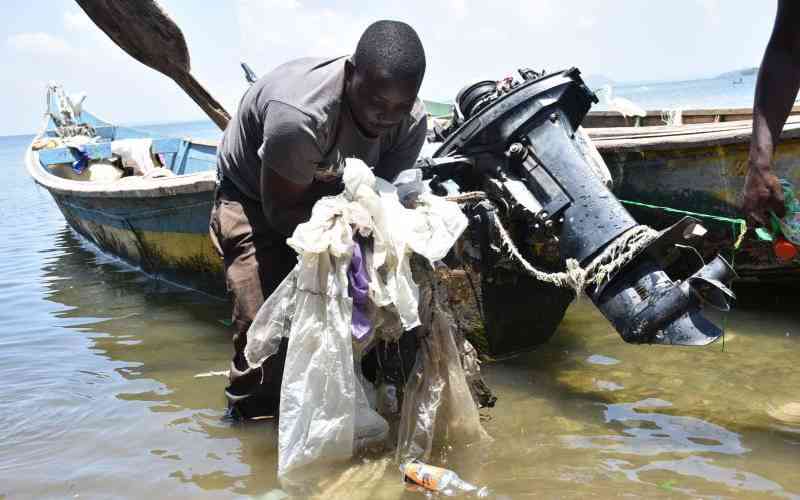
Kenya grabbed headlines in 2017 when it banned single-use plastic bags. This was celebrated as one of the sternest in the world. The move was preceded by the country's decision to sign the Clean Seas Initiative, making it one of the first African nations to commit to limiting plastic in its waterways.
Currently, the success rate of the ban is recorded at approximately 80 per cent in the fight against plastic pollution, according to National Environment Management Authority.
However, plastic pollution remains one of the biggest threats to the environment. Even as some is recycled, a significant amount ends up in lakes and oceans, swept there via rivers or sewage drains or after being discarded on beaches, or dumped from ships.
Environmentalists, who are calling for immediate radical action, have reiterated that the plastic waste crisis continues to destroy habitats, killing wildlife and marine life and contaminating the food chain.
A report titled Plastic Waste Transport From the Nile River and its Major Tributaries by Nile Basin Initiative (NBI) indicates that the private sector struggles to provide adequate waste management services due to poorly established municipal management systems, weak implementation capacities, and insufficient equipment and infrastructure.
"As a result, low-income areas have dysfunctional waste collection systems provided by the informal sector. In general, low levels of waste collection or non-existent collection is the norm," reads the report in part.
The report shows that Kenyan towns and cities operate with a mix of public, informal, and private waste management models. Municipal authorities are responsible for the provision of waste management services in public areas and private spaces.
According to the report, in Kisumu city, for example, only 38 per cent of households are subscribed to Small Scale Waste Management services. Waste recovery and recycling in Kisumu consists of an unstructured system where waste pickers, itinerant waste buyers, and a few processors of waste to products are the main actors.
Approximately 7 per cent of the roughly 500,000 tonnes per year of plastic waste generated is recycled.
Data from the county department of environment states that Kisumu County, with a population of 721,082, generates approximately 400 tonnes of solid waste per day, 20-25 per cent of which is collected at the open dump site.
Officials at the department are currently fostering new options and opportunities for solid waste collection and disposal. While these measures are commendable, County director of environment Ken Koyoo states the efforts in place are not adequate to address the urgency given the scale of the situation.
While Eldoret town with a population of 475,716 generates is estimated to generate 600 tonnes of waste generated per day of the waste only 55 per cent is collected with 15 per cent of the waste recovered while 45 per cent goes uncollected, according to Plastic Waste Transport from the Nile River report.
NEMA officials indicate the wastes have highly polluted River Sosiani which flows through the town. They reveal that waste disposal management in the town is a major challenge, especially in residential areas, some hotels, and health facilities especially in Langas, Huruma, Mwanzo, Bacon, and Shauri Moyo highly populated residential.
In Kisii town, with a population of 183,000, NEMA has already raised a red flag over the dumping of waste. The town is estimated to generate 200 tonnes of waste and only 24 per cent is collected.
Kakamega County, with a population of 91,768, produces mixed wastes comprising of food waste and packaging materials such as cartons and plastic. Recently the county management invested in a Sh 6 billion project expected to incinerate approximately 800 tonnes of municipal solid waste per day.
In Nairobi, it is estimated that 2,400 tonnes of solid waste are generated every day, 20 per cent of that being in plastic form, mostly single-use plastic like straws, bottles and packaged consumer goods.
According to Plastic Waste Transport from the Nile River and its Major Tributaries into the Marine Environment by Nile Basin Initiative (NBI), each person in the country generates at least 11 kilogrammes of plastics per year the waste is collected through a mixed approach of public, informal and privatised models with an average collection rate of 27 per cent plastic wastes.
The country grapples with illegal, unsanitary landfills which are often operating over the capacity of the waste only 7 per cent of the generated plastic waste is recycled. The recycling sector is largely informal.
With the burden of waste management and plastic pollution in the country, NEMA has developed key approaches to dealing with the menace. The agency is tapping into the introduction of incentives in the waste management cycle such as generation, segregation, collection, transportation, treatment and disposal.
In addition, NEMA is phasing out waste burning and, in return, establishing waste operational zones and upscaling the activities of the informal sector to link up with the existing formal recycling industries.
Further, it is establishing infrastructure and systems for residual waste through a stepwise phasing out of illegal dumpsites to the establishment of sanitary landfills.
 The Standard Group Plc is a multi-media organization with investments in media
platforms spanning newspaper print
operations, television, radio broadcasting, digital and online services. The
Standard Group is recognized as a
leading multi-media house in Kenya with a key influence in matters of national
and international interest.
The Standard Group Plc is a multi-media organization with investments in media
platforms spanning newspaper print
operations, television, radio broadcasting, digital and online services. The
Standard Group is recognized as a
leading multi-media house in Kenya with a key influence in matters of national
and international interest.











